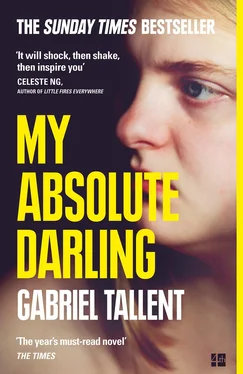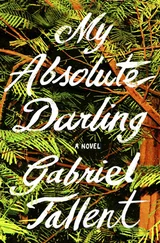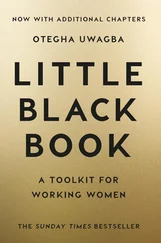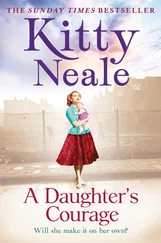Turtle is lying. It’s there in Anna’s face, the recognition.
“Is that true?” Anna says. “You’re studying an hour every night?”
“Well,” Turtle says.
Anna watches her.
“Most nights,” Turtle says. She has to protect the way she cleans the guns in front of the fire while Martin waits reading by the fireplace with the firelight escaping onto their faces and escaping out into the room and then being dragged hard back across the floor to the coals.
Anna says, “We’re going to need to talk it over with Martin.”
Turtle says, “Wait. I can spell ‘synecdoche.’”
“Julia, we need to talk to your dad,” Anna says.
Turtle says, “S-I-N,” and then stops, knowing that it’s wrong, that she is wrong, and she cannot for the life of her remember what comes after that. Anna is looking at her very coolly, interrogatively, and Turtle looks back, thinking, you bitch. She knows that if she protests more, if she says anything more, she will give something away.
“Okay,” Turtle says, “okay.”
After school, Turtle goes to the office and sits on a bench. The bench faces the front desk, and beyond the front desk, the administrative assistant’s desk and a short hallway to the green-painted door of the principal’s office. Behind that door, Anna is saying, “God love her, Dave, but that girl needs help, real and substantive help, more help than I can give her. I have thirty students in that class, for crying out loud.” Turtle sits cracking her knuckles, the receptionist giving her quick, uncomfortable glances over her computer. Turtle is hard of hearing, but Anna is talking in a flustered, raised voice, saying, “You think I want to talk to that man? Listen, listen—misogyny, isolation, watchfulness. Those are three big red flags. I’d like her to see a counselor, Dave. She’s a pariah, and if she goes on to high school without us addressing that, she will fall further behind . We can chase down that gap now—yes, I know we’ve been trying—but we’ve got to keep trying. And if there is something wrong—” Turtle’s guts clench. Christ, she thinks.
The receptionist racks a stack of papers sharply on the desk and walks down the hall to the door, Principal Green saying something and Anna flustered, “No one wants that? Why does no one want that? There are options is all I’m saying— Well. No. Nothing. All I’m—” And the receptionist stands at the door and knocks and slips her head into the room, saying, “Julia is here. Waiting for her dad.”
There is a hush. The receptionist walks back to her desk. Martin pushes the door open, looks once at Turtle, and walks to the counter. The receptionist gives him a hard look. “You can just …” she says, motioning with the papers that he can go right in. Turtle rises and goes after him, past the desk and down the hall, and he knocks once and pushes the door open.
“Come in, come in,” Principal Green says. He is an enormous man, pink-faced, with large, soft pink hands. His fat hangs down and fills up his pleated khaki trousers. Martin closes the door and stands in front of it, as tall as the door itself, almost as broad. His loose flannel shirt is partly unbuttoned and shows his clavicles. His thick, long brown hair is in a ponytail. His keys have begun to cut their way out of his pocket, leaving patches of white threads. If Turtle hadn’t known, she could have told that Martin had the gun just from the way he wore his flannel, just from the way he took his seat, but neither Principal Green nor Anna thinks of it; they do not even know such things are possible, and Turtle wonders if there are things that she is blind to that other people can see, and what those things might be.
Principal Green picks up a bowl of Hershey’s Kisses and holds it first to Martin, who shows his palm to decline, and then to Turtle, who doesn’t move. “So, how has your day been so far?” he asks, setting the bowl back on his desk.
“Oh,” Martin says, “I’ve been better.” Turtle thinks, that is wrong, that is the wrong way, but how could you know better, you’re just a bitch.
“And, Julia, how have you been?”
“I’m good,” Turtle says.
“Ah yes, well, I bet this is a little stressful,” Principal Green says.
“So?” Martin says, gesturing him on.
“Let’s talk about it, shall we?” Principal Green says. The new teachers go by their first names, but Principal Green is a generation older, maybe two. “Since we last spoke, Julia has continued to struggle in her classes and we’re concerned about her. Part of the problem is her grades. Her reading comprehension is not where it could be. She struggles on tests. But for us, the problem—more than any question of her aptitude—is her sense of, well, perhaps her sense that the school may not be welcoming, and we do believe that she needs a certain level of comfort, a certain level of belonging before she can begin to thrive in school. This is the problem as we see it.”
Anna says, “I have been working with Julia quite a bit, and I think that—”
Martin interrupts her, leans forward in his seat, clasps his hands. He says, “She will make the work up.”
Turtle stifles her surprise, looking over at Martin, thinking, what are you doing? What she wants is for Martin to look right at Anna, and she knows he can do it—look right at her, and make her feel good about this whole thing.
Anna says, “Julia seems to have particular trouble with girls. We were thinking—perhaps she might be willing to see Maya, our counselor. A lot of our students find talking to someone very grounding. We believe Julia might gain from having a friendly face here at the school, somebody she can confide in—”
Martin says, “You can’t make Julia’s graduation contingent on her seeing a counselor. So what can we do to make sure she graduates?” He looks at Principal Green. A kind of rising horror is on Turtle, and she quells it, because perhaps she doesn’t understand, and perhaps Martin does. She thinks, what are you doing, Daddy?
Anna says, “Martin, I think there’s been a misunderstanding. Julia will not be held back. Since we no longer have the budget for summer school, and since any continuation school is very limited, all students are promoted into high school. But if she leaves middle school without robust friendships and with her current study skills and level of reading, poor grades will affect her high school curriculum and subsequently her college opportunities. Which is why it is important to continue addressing these questions now , in April, while there is still time left in the school year. It is strictly an issue of Julia’s welfare, and we think that a weekly meeting with somebody she can talk to should be a part of any solution.”
Martin leans forward and his chair creaks. He makes eye contact with Principal Green, presents his hands as if asking, if there are no consequences, what the hell are we doing here?
Principal Green looks at Anna. Martin looks at her as if wondering why she is being looked at. Then he looks quickly away, engaging Principal Green’s attention. Martin thinks Principal Green is in charge and that Principal Green is the nut he can crack. To Martin, Anna seems both too bothersome and too powerless. Turtle doesn’t know why he thinks this. In all of these conversations, she’s never known Principal Green to be anything but unimpressed with Martin. She can see it, how solid he is. He has, Turtle knows, a squinty-eyed son with Down syndrome and he has been principal here for well over twenty years, and Martin is not talking his language. Nothing Martin can say will convince Principal Green of anything. This meeting is all about being polite and showing that Turtle is engaged, showing that Martin is also engaged with Turtle’s teachers, and Martin isn’t doing it right, isn’t saying the right things, is trying to bully Principal Green like he’s tried to bully Principal Green before.
Читать дальше












